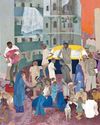
Times change and attitudes change, but does the impact of social stigmas on one’s life change as well? I ask this because I am what society calls ‘illegitimate’, a term that brands an individual with the shame of being born out of wedlock, casting a shadow on their identity. Was this my fault? I don’t think it was. But I know that if people found out about this, they would look down on me, and my parents. It makes me wonder—how many people who knew us during the ’70s, ’80s or even the ’90s would have associated themselves with, or acknowledged, our family if they knew this fact?
I was born in 1967 to parents who loved me. How do I know they loved me? Well, if they didn’t, they would have taken the easy way out. They would have aborted me and lived an easy life, free of stigma. But they didn’t. Instead, they decided to try and face society the best way they could and let me come into this world. For this I shall be ever grateful, because today, I have a wonderful husband and two amazing children simply because … they let me live.
I discovered my illegitimacy almost four decades ago, when my mother decided that I should know the truth. I think I was around 13 at the time. I am not sure what I felt when she first broke the news to me. I don’t think I fully realized what it meant. Realistically, I know that it is foolish to blame myself because I didn’t do anything to be born this way, nor did I ask for things to turn out as they did. I cannot help but think about how much the shame of being discovered haunted me for so many years. After all, I was born in India, a country where illegitimacy is considered taboo. At least it was in the 1960s when I was born.
This story is from the {{IssueName}} edition of {{MagazineName}}.
Start your 7-day Magzter GOLD free trial to access thousands of curated premium stories, and 9,000+ magazines and newspapers.
Already a subscriber ? Sign In
This story is from the {{IssueName}} edition of {{MagazineName}}.
Start your 7-day Magzter GOLD free trial to access thousands of curated premium stories, and 9,000+ magazines and newspapers.
Already a subscriber? Sign In

BOOKS
Books review

STUDIO - Off Lamington Road by Gieve Patel
Oil on Canvas, 54 x 88 in

NEWS FROM THE WORLD OF MEDICINE
FOODS THAT FIGHT DEMENTIA

TO HELL AND BACK
The Darvaza crater in Turkmenistan is known as the Gates of Hell. I stood on its edge - and lived to tell the tale

THE SNAKE CHARMERS
Invasive Burmese pythons are squeezing the life out of Florida's vast Everglades. An unlikely sisterhood is taking them on

Sisterhood to Last a Lifetime
These college pals teach a master class in how to maintain a friendship for 50-plus years

...TO DIE ON A HOCKEY RINK
ONE MINUTE I WAS PLAYING IN MY BEER LEAGUE, THE NEXT I WAS IN THE HOSPITAL

Just Sit Tight
Broken, battered and trapped in a ravine for days, I desperate driver wonders, \"Will anyone find me?\"

Allow Me to Mansplain...
If there's one thing we know, it's this: We're a nation of know-it-alls

THE BITTER TRUTH ABOUT SUGAR (AND SUGAR SUBSTITUTES!)
It's no secret that we have a serious addiction. Here's how to cut back on the sweet stuff, once and for all.